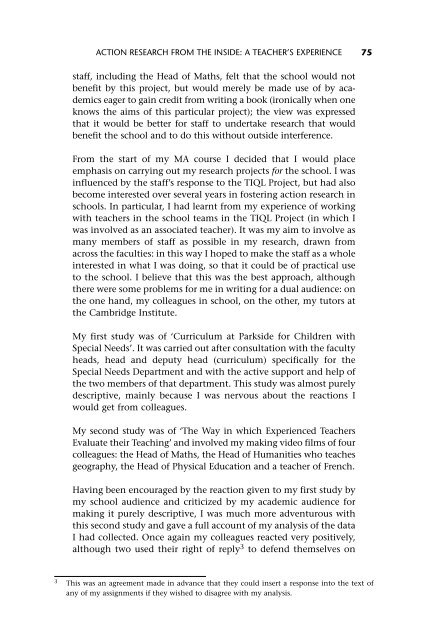Action Research A Methodology for Change and Development
Action Research A Methodology for Change and Development
Action Research A Methodology for Change and Development
You also want an ePaper? Increase the reach of your titles
YUMPU automatically turns print PDFs into web optimized ePapers that Google loves.
ACTION RESEARCH FROM THE INSIDE: A TEACHER’S EXPERIENCE 75<br />
staff, including the Head of Maths, felt that the school would not<br />
benefit by this project, but would merely be made use of by academics<br />
eager to gain credit from writing a book (ironically when one<br />
knows the aims of this particular project); the view was expressed<br />
that it would be better <strong>for</strong> staff to undertake research that would<br />
benefit the school <strong>and</strong> to do this without outside interference.<br />
From the start of my MA course I decided that I would place<br />
emphasis on carrying out my research projects <strong>for</strong> the school. I was<br />
influenced by the staff’s response to the TIQL Project, but had also<br />
become interested over several years in fostering action research in<br />
schools. In particular, I had learnt from my experience of working<br />
with teachers in the school teams in the TIQL Project (in which I<br />
was involved as an associated teacher). It was my aim to involve as<br />
many members of staff as possible in my research, drawn from<br />
across the faculties: in this way I hoped to make the staff as a whole<br />
interested in what I was doing, so that it could be of practical use<br />
to the school. I believe that this was the best approach, although<br />
there were some problems <strong>for</strong> me in writing <strong>for</strong> a dual audience: on<br />
the one h<strong>and</strong>, my colleagues in school, on the other, my tutors at<br />
the Cambridge Institute.<br />
My first study was of ‘Curriculum at Parkside <strong>for</strong> Children with<br />
Special Needs’. It was carried out after consultation with the faculty<br />
heads, head <strong>and</strong> deputy head (curriculum) specifically <strong>for</strong> the<br />
Special Needs Department <strong>and</strong> with the active support <strong>and</strong> help of<br />
the two members of that department. This study was almost purely<br />
descriptive, mainly because I was nervous about the reactions I<br />
would get from colleagues.<br />
My second study was of ‘The Way in which Experienced Teachers<br />
Evaluate their Teaching’ <strong>and</strong> involved my making video films of four<br />
colleagues: the Head of Maths, the Head of Humanities who teaches<br />
geography, the Head of Physical Education <strong>and</strong> a teacher of French.<br />
Having been encouraged by the reaction given to my first study by<br />
my school audience <strong>and</strong> criticized by my academic audience <strong>for</strong><br />
making it purely descriptive, I was much more adventurous with<br />
this second study <strong>and</strong> gave a full account of my analysis of the data<br />
I had collected. Once again my colleagues reacted very positively,<br />
although two used their right of reply 3 to defend themselves on<br />
3 This was an agreement made in advance that they could insert a response into the text of<br />
any of my assignments if they wished to disagree with my analysis.

















